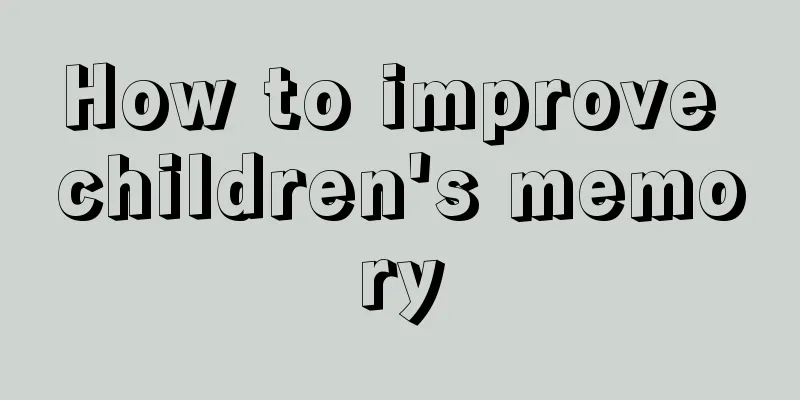19-month-old baby early education

|
For people who have just become parents, it is not just about taking care of the baby's diet and so on. What is more important should be the child's early education. In fact, the best time period for children's education is when they are one or two years old. Because children at this age are gradually improving their speaking ability. The body's various functions are also constantly growing, and the baby's education is very important at this time.
1. Exercise (1) Go up and down the stairs holding the railing: Parents can use toys to lure children up and down the stairs to protect them. Start by climbing up 2 to 3 steps, then gradually move up to multiple steps. After your child can climb the stairs steadily, teach him to go down the stairs so that he can understand the concept of depth. Be sure to pay attention to safety. (2) Walking freely: Children move more on the ground. Children like ball toys the most. Parents should cooperate with their children to throw, catch, roll, kick the ball, etc., and let the children push the stroller forward, backward, and turn.
2. Cognition (1) Life imitation games: coaxing dolls to sleep, playing at doll house, and learning to cook. These games help children understand the content and meaning of the games, learn to cooperate with others and put away toys after playing. This helps them exercise their hands-on skills and social adaptability. (2) Reading and turning pages: Look at pictures and use simple language to explain. Although children may not understand much, it can enrich their language environment and attract their attention. Repeated explanations and questions can strengthen their memory and teach them to turn pages by themselves. 3. Language (1) Understand language and requests: Use language to mobilize his activities and ask the child to do things, so that he can form the concept of doing things according to instructions. Pay attention to learning and using negative language, so that children can understand concepts such as "have, don't have, want, don't want, yes, no". (2) Reciting nursery rhymes: Repeat a short nursery rhyme. At first, the child may only know a few words and cannot say a complete sentence, but he or she can gradually memorize the nursery rhyme and recite it independently.
4. Life and communication (1) Putting on a hat and taking off socks: Let the child learn to put on a hat in front of a mirror and take off socks before going to bed, or unbutton the clothes and let the child Let children take off their shoes by themselves, cultivate a sense of self-service, and don’t discourage their enthusiasm. (2) Life routine: Arrange children’s daily routine according to their life rhythm, and cultivate good habits of washing face in the morning, going to bed on time, and washing feet and face before going to bed. |
<<: 18-month-old baby early education
>>: My 9 month old baby can't crawl
Recommend
What to do if your baby has green poop due to cold
The food that babies eat every day is breast milk...
What should I do if my child has a left humerus fracture?
In the case of a child's left humerus fractur...
What is the reason for the baby's heavy breathing when feeding?
When feeding, you may find that your baby's b...
Three month old baby has dry skin
The skin of newborn babies is very delicate and l...
What happens if a child has itchy red bumps on his body?
Many people often have itchy skin, especially som...
How to quickly whiten a tanned child?
Many families are worried that their children wil...
Reasons why babies frequently wake up at night
Babies sleep longer than adults because they are ...
What should I do if my baby is severely constipated? Combining multiple methods to solve the problem!
As we all know, constipation is very uncomfortabl...
What should I do if my three-year-old baby is deficient in calcium and zinc?
Nowadays, more and more babies are suffering from...
Massage for children with tics
Tourette syndrome is a disease with a relatively ...
What are the dangers of fetal hypoxia?
Pregnancy is not an easy thing. For this reason, ...
White blood cell high fever recurring?
A baby's fever is related to pathogen infecti...
How to treat urinary tract infection in children?
Children are active individuals, but this activit...
How to give Yinzhihuang to babies
Most babies will show yellowing signs on their bo...
Solutions to excessive calcium supplementation in young children
Many of our young children may be prone to malnut...









